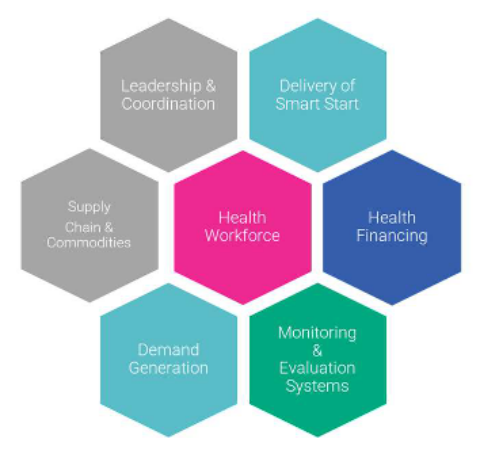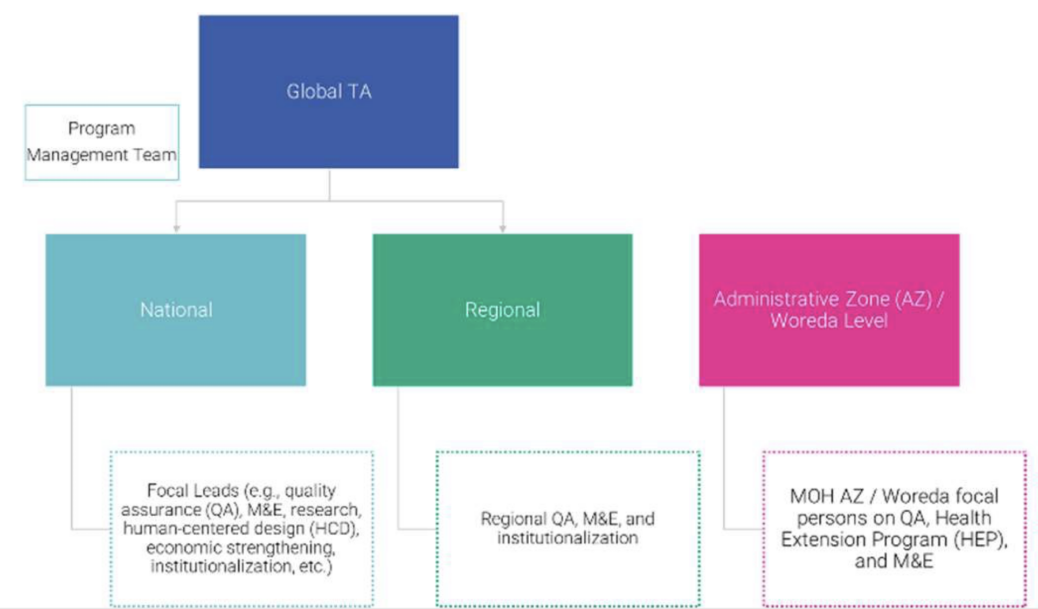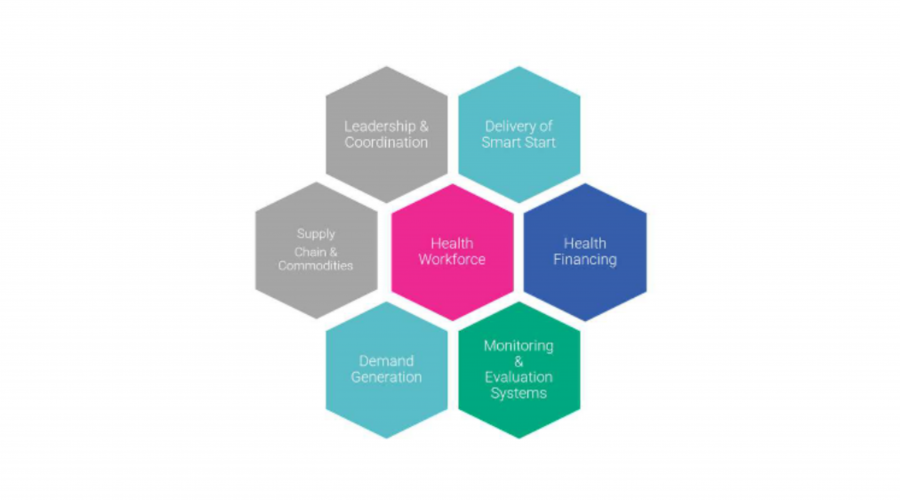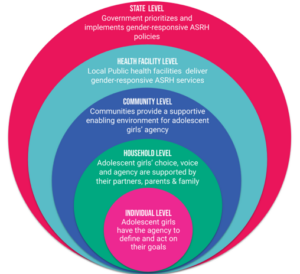By Meghan Cutherell, Sr. Technical Program Manager; Seyoum Atlie, RISE Project Director; Dr. Rahel Demissew, SRH Director; at Population Services International (PSI), Ethiopia.
Introduction
It is imperative that the development community move beyond boutique, unscalable program designs towards sustainable scale-up of promising interventions, particularly through the public sector. However, pursuing sustainable scale through the public sector often puts organizations at cross-roads. The transition from direct project implementer to technical assistance (TA) provider, capacitating the government and system to own and be accountable for implementation, is a necessary approach to achieving sustainable scale.
Yet, this transition brings with it critical tensions and considerations. In this blog, we reflect on our own experience in making this transition and provide lessons for the scaling-up community. Under the Adolescents 360 (A360) investment (2016-2020), PSI Ethiopia pursued the design and proof of concept for an adolescent sexual and reproductive health (ASRH) intervention, Smart Start, which supports married adolescent girls ages 15-19 in rural areas of Ethiopia to understand the utility of contraception in pursuing their life goals and to access quality, adolescent-friendly contraceptive service delivery.
In a follow-on investment, the Roadmap for Integrating Smart Start in Ethiopia (RISE), the FMOH is leading, with technical support from PSI, the institutionalization and scale of Smart Start to 465 woredas across the agrarian regions in Ethiopia, around 50% of all woredas nationally. The overarching goal of RISE is to contribute to a reduction in teenage pregnancy in Ethiopia, a key priority for the MOH. In the initial stages of the RISE investment, the FMOH incorporated Smart Start as a gold standard approach for serving married adolescents into key policy documents and health worker training materials, including the Integrated Refresher Training (IRT) for Health Extension Workers (HEWs). The FMOH then mobilized $6m+ to roll out the IRT inclusive of Smart Start to 26,000 HEWs, deploying them to their communities to support married adolescent girls with SRH services. Since mid-2021, Smart Start has supported nearly 300,000 girls to take up a method of contraception for the first time. RISE’s TA to strengthen the system has now covered 7,450 health posts across 310 woredas in Ethiopia.
Key Learnings
Solidifying a Technical Assistance (TA) Approach Early Our approach to providing TA evolved over the first few project years as we understood more about what was needed to support the fidelity and quality of Smart Start as it went to scale. This TA was spread across all layers of the health system in Ethiopia (Federal Ministry of Health, Regional Health Bureaus, Zonal Health Departments, Woreda Health Offices, Primary Health Care Units, and Health Posts). Though the TA approach was refined over time it wasn’t until early 2023 that we solidified this into a concrete TA framework.
This framework (Figure 1), drawing inspiration from the WHO health system building blocks, provided an adaptable structure that could be used to define the critical ingredients that we felt drove success for the project. Also important to the implementation of this framework was the layering of project personnel at all levels of the government (Figure 2) to transfer capacity and ownership over to government counterparts. This framework has created structure and consistency to our provision of TA, and we recommend projects looking to make a similar transition from implementer to TA provider consider co-creation of this type of framework from the outset, with government counterparts. Though this framework does not have to be oriented, as ours is, using the WHO building blocks as a guide, it should clearly lay out the key actions that you will take to build system capacity and associated measures of success for the application of your TA.


Contributing to Broader Systems Strengthening Gains
Though RISE ultimately is held accountable only to the sustainable scale of a specific intervention, Smart Start, our reflection is that TA for institutionalization and scale of a specific intervention cannot be separated from TA to support broader system capacity. Taking the example of one specific health system building block (Service Delivery) and comparing our own TA framework against the tool for adolescent- and gender-responsive health systems developed through the MOMENTUM Country and Global Leadership project, it’s clear that the TA that we identified as necessary to support Smart Start’s institutionalization and scale is also aligned with that needed to support a more adolescent-friendly health system. For example, this includes the incorporation of adolescent health indicators in joint supportive supervision (JSS) and quality assurance activities, training and coaching of health providers, and direct engagement of adolescents in the design and delivery of health services.
Every project pursuing sustainable scale should be considering this from the outset – how can we pursue both project-level outcomes for users interacting with our scaled innovation and broader health systems strengthening aims that can provide value outside of our specific investment. This application of TA is more locally led and responsive to the needs of government counterparts.
Government Ownership and Accountability
In stepping back from direct implementation to a TA provision role, though we were still accountable internally for our own project targets, it was clear that the government must drive accountability at all levels of the system for the plans for sustainable scale to succeed. We experienced firsthand how this accountability could be applied at the end of 2022. At this time, MOH counterparts alongside PSI and our funders determined that there was not enough momentum being made towards the goals set for RISE and elected to implement an acceleration plan across all implementation regions. During this acceleration period, facility readiness assessments were conducted, joint teams conducted site-level supportive supervision, and real time performance was tracked via a Telegram group.
Weekly performance reviews were conducted to identify corrective action points. This acceleration plan triggered a 7x increase from September to October 2022 in terms of new contraceptive users supported through the system. This rapid progress was made possible because the MOH was positioned as the owner and implementer of RISE from the outset, there was strong follow-up on acceleration period goals at all levels of the system, tailored messages were disseminated to lower government structures routinely, and local opportunities (such as community gatherings) were leveraged to accelerate progress. Though this type of acceleration plan not be appropriate for all sustainable scale processes, it demonstrates the potential of harnessing government commitment towards a singular goal during a more targeted period to catalyze progress.
Conclusion Sustainable scale of proven health innovations is essential to make progress in national and global development outcomes. Through RISE, sustainable scale is being achieved through the ownership and accountability of the MOH and the effective TA mechanism implemented by PSI to strengthen the capacity of the system to implement Smart Start. We present these reflections above in hopes that they may provide value to other partners looking to make a similar transition. We also acknowledge that we are still learning and eager to have thought partners who can strengthen our own approaches and encourage you to reach out if you have interest in sharing learning.
“Yes, [we own the program completely] because PSI supports us by providing technical assistance. It doesn’t provide financial support. The government does everything.” – Government Stakeholder, Ethiopia, RISE Process Evaluation 2023, Itad “PSI has no focal person at the lower levels for the program implementation, although they frequently visit the Health Centers and Health Posts for monitoring and collecting reports. The government has taken the responsibility of implementing the program; therefore I feel ownership of the Smart Start program.” – Government Stakeholder, Ethiopia, RISE Process Evaluation 2023, Itad.
RISE is funded through the support of the Bill and Melinda Gates Foundation (BMGF) and the Children’s Investment Fund Foundation (CIFF).




